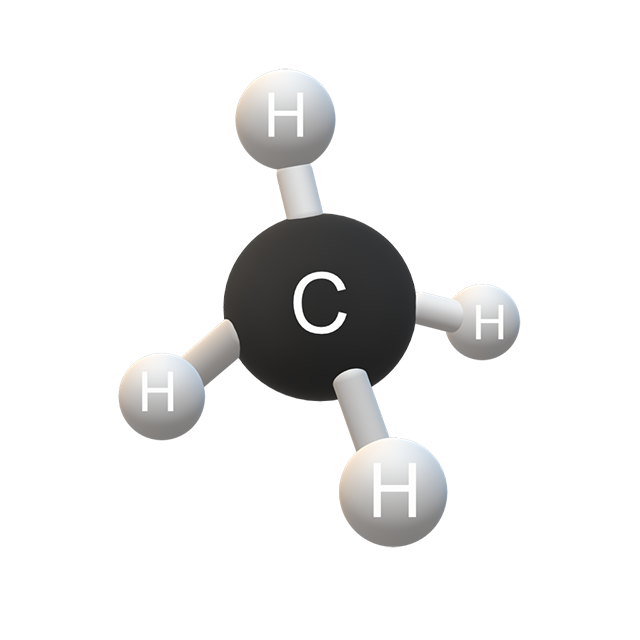
Methane CH4. Credit: Christinelmiller, CC BY-SA 4.0, via Wikimedia Commons
Methane (CH4) is a potent but often overlooked contributor to climate change that needs mitigation.
A new study, “The Methane Imperative,” published in Frontiers in Science, shifts the spotlight from CO2 to methane (CH4), a potent but often overlooked contributor to climate change.
The Growing Threat of Methane
Methane emissions have been rising sharply, particularly since 2006, driven predominantly by activities in wetlands and the fossil fuel industry. The study emphasizes that methane is responsible for nearly as much global warming as CO2, making its control crucial for limiting global temperature rises to 1.5°C or 2°C. If unchecked, rising methane levels threaten to undermine efforts to reach net-zero carbon targets, underscoring the urgency for immediate action.
Cost-effective Mitigation Strategies
The research highlights several methane mitigation strategies that are not only effective but also economically viable. By comparing the costs of these strategies with the financial damages caused by methane-related warming, the study makes a compelling case for robust, legally binding regulations to promote their adoption. These strategies include:
- Implement Strong Regulations: Enforce legally binding measures to ensure that methane reduction targets are met.
- Introduce Methane Pricing: Establish mechanisms that reflect the environmental cost of methane emissions, incentivizing reductions.
- Expand Technological Solutions: Invest in advanced technologies to capture and convert methane, particularly in the oil, gas, and waste sectors.
- Enhance Monitoring Systems: Use satellite and ground-based tools to track methane emissions accurately and identify major emission sources.
- Promote Sector-Specific Policies: Develop policies tailored to the primary methane sources in each sector, ensuring efficient mitigation.
- Encourage International Collaboration: Foster global partnerships to share technologies, best practices, and resources for methane mitigation.
- Educate Stakeholders: Raise awareness among governments, businesses, and the public about methane’s role in climate change and the benefits of its reduction.
Methane and CO2 Reduction: An Interconnected Approach
One of the key insights from the study is the interconnectedness of methane and CO2 reduction efforts. Strategies that target methane emissions can significantly aid in achieving net-zero CO2 goals through mechanisms like bioenergy with carbon capture and storage (BECCS) and afforestation. However, these strategies often require extensive land use, which could be optimized by reducing methane emissions from agricultural sources, particularly livestock.
Health and Economic Benefits of Methane Reduction
Reducing methane emissions not only helps mitigate global warming but also offers considerable health benefits. The study points out that lowering methane levels can significantly reduce surface ozone pollution, which affects respiratory health and crop yields. Furthermore, the economic benefits of addressing methane emissions include avoiding substantial costs associated with climate-related damages, enhancing the overall cost-effectiveness of methane reduction strategies.
Global and National Actions
“The Methane Imperative” calls for global cooperation and the implementation of national policies tailored to specific methane sources. These policies should be designed to leverage the unique economic and environmental contexts of each country, ensuring that methane reduction efforts are both effective and sustainable.
Summing Up
Methane may be less discussed than CO2, but its impact on global warming is substantial and undeniable. As the study suggests, targeted methane reduction is an essential component of the broader climate mitigation agenda. By adopting comprehensive strategies that address both CO2 and methane, the world can make significant strides towards the ambitious but crucial goal of limiting global warming.
Source: Shindell, D., Sadavarte, P., Aben, I., Bredariol, T. d. O., Dreyfus, G., Höglund-Isaksson, L., … & Maasakkers, J. D. (2024). The methane imperative. Frontiers in Science, 2, 1349770.
